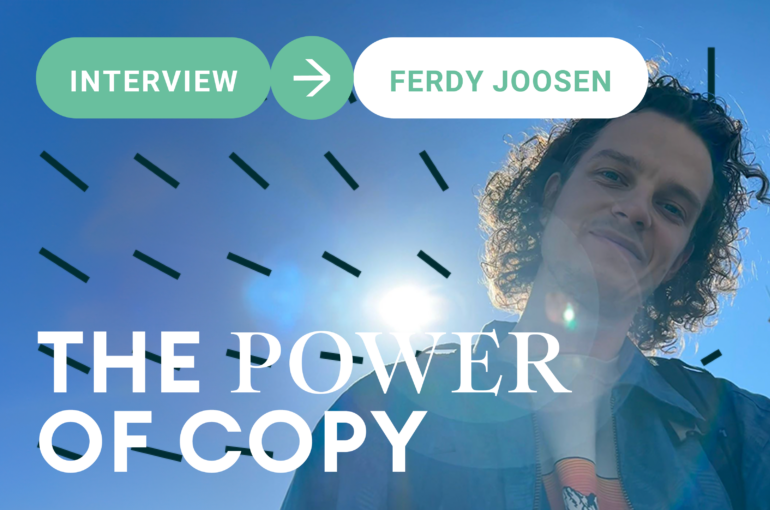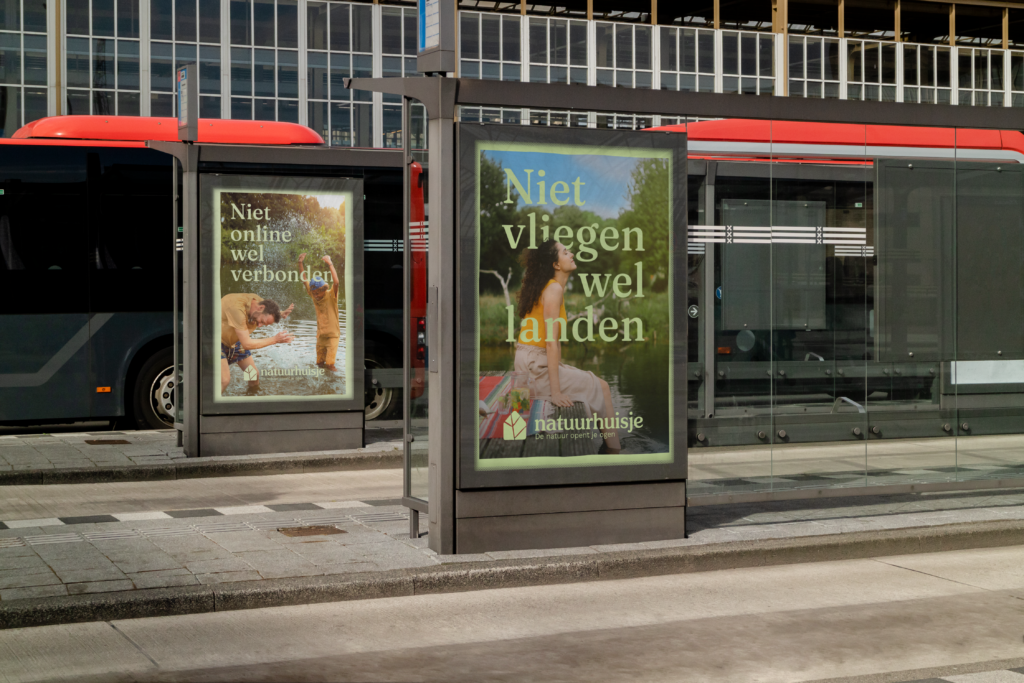“Words can move mountains when they’re put in the right order.” Ferdy Joosen about the power of copy.

Ferdy Joosen, a creative copywriter at Gardeners, wasn’t allowed to have a TV in his room when he was a kid. His parents’ argument was, ‘A TV just gobbles up time and constrains you from spending time together.’ Ferdy, in his adolescence, obviously disagreed. Moreover, all of his friends had TV’s in their rooms, so he felt the need to come up with a clever strategy to get what he wanted. He took a logo from a law firm in Oosterhout, his hometown, and crafted a detailed letter, posing as a client who had sought help from a lawyer. The letter included classical jargon like ‘the involved party’ and similar terms.
At the time, Ferdy was convinced his parents would fall for it, but unfortunately, the only result was that his parents had a good laugh about it. Later, Ferdy realised this was where it all started. “It was there and then that I first experienced the potential power of creative copy to solve problems.”
The moral compass
Ferdy’s career began at a big advertising agency where they argued that you need to have commercial clients to be able to work for sustainable clients. “I just felt that this could and should be different”, said Ferdy. “At some point, I was assigned to work for a lottery brand, but it didn’t align with my moral beliefs, and felt like a waste of my creativity.” Coincidentally, he stumbled upon the advertising agency Gardeners. “The connection felt good right from the start. Here, I could use my creativity to do good, and make a positive impact on the world around us.”
Niet vliegen, wel landen (“Not flying, but landing”)
Recently, Ferdy and his creative partner Elisa came up with the “Niet vliegen, wel landen” campaign for Natuurhuisje. Four very powerful words. When booking a holiday home at Natuurhuisje, you directly contribute to sustainable tourism. Their impact strategy is aimed at nature conservation and stimulation of local biodiversity.
Ferdy’s campaign won several awards. Ferdy: “The fact that Natuurhuisje enables you to enjoy a truly guilt-free holiday is something we wanted to communicate. Quickly, we landed on the idea to create a ‘not …, but …’ construct , but it took some finetuning before we figured out our final line. We were collecting hundreds of variations like ‘No footprint, but a footprint’ in a document. And then suddenly it hit me. I remember very well that I was screaming to Elisa, “Holy shit, I think I found it!”
Due to the campaign, Natuurhuisje’s revenue increased by 22%. It also made a significant impact on the advertising industry, as it brought back the love for copywriting. And it showed that you don’t need tons of budget to produce something great. Did it have an impact on the environment as well? Ferdy: “You could say that due to the increase in bookings at Natuurhuisje, fewer people opted for a holiday by plane and more people went on holiday in nature. Which is a good thing, because Natuurhuisje supports projects for local biodiversity, and they can fund even more projects now that they have had an increase in their bookings and revenue.’

Tap into the theatre of the mind
We asked Ferdy what tagline he wished he had come up with himself. Ferdy: “What I think is a great tagline is ‘Buiten begint bij Bever’ (Outdoor starts at Bever), created by KesselsKramer. I love the outdoors and like to spend time hiking in the mountains. This tagline is so powerful because it’s simple, but at the same time so well thought out. And also, I like alliterations. Coming up with a tagline where all the words start with a B while still conveying the brand message? Really impressive. The short sentence also immediately conveys a feeling. Words can move mountains when they’re put in the right order. And when you do it right, they open up a whole world of experiences in people’s minds, even without using any images. That’s the power of copy. You can tap into the theatre of the mind.”
Copywriting and sustainability
Ferdy likes to use his creative copywriting for sustainable causes. He explains that you should never forget to take the audience’s desires into account. Ferdy: ”I see creative copy as a means to achieve certain objectives. For example, take a look at the communication from the left-wing parties during the last elections in The Netherlands. They focused too much on doom scenarios, which negatively backlashed in the election results. If the campaign message had been formulated differently, more positively perhaps, the voters would have felt much more attracted to the plans. Biden’s administration, on the other hand, did this very well in the USA. They proposed a solid green tax deal but called it “The Inflation Reduction Act”. Less inflation is in fact the end-result when you invest in green alternatives, and it’s exactly what people wanted to hear. So when you write down your message, don’t forget the ‘what’s-in-it-for-me’ of your target audience.”
Copywriting and ChatGPT
Of course, nowadays you can’t talk about copywriting without bringing up ChatGPT. Ferdy has his own take on this. Ferdy: “ChatGPT can be a great sparring partner to objectively assess certain things from an outsider’s perspective. However, what concerns me is that finding ‘answers’ becomes too easy, which can make people even more lazy. That’s exactly what we shouldn’t encourage. So, I think AI is beneficial in itself, but it shouldn’t become a regular pattern in your life where you use ChatGPT for every little thing. It could lead to less independent thinking, which isn’t healthy for humans.”
Copywriting tips from Ferdy
Would you like to write powerful copy yourself too? These are Ferdy’s best tips:
- Consistency is key
Ferdy: “I think it’s very important to stay true to your tone-of-voice as a brand. Take Patagonia for example. They know very well that they’re playing the capitalist game, and they can’t avoid it as a clothing brand. They chose to be transparent about that in everything they do. Besides, with actions such as ‘we make the earth our only shareholder’ and ensuring all profits go to a foundation linked to this cause, they have established a pioneering position. It’s a brand that has its act together. Everything you read from them is written in the same tone. I find that quite impressive. It’s the same with Oatly, who also uses a very distinctive tone-of-voice.”
- Keep in mind how people can read it
Ferdy: “From internal emails to communication in major campaign messages from political parties, always think about how people could read it. People will read the copy in their own voice, while you would ideally want them to read it in yours. Therefore, carefully consider how something can be interpreted. I always try to write in a way that I want people to read. So, if I need a few extra words to make it clearer, I think that’s definitely worth it. Also, I think it’s good to break rules now and then. There is a style rule for example that says you shouldn’t put a comma before the word ‘and.’ In my opinion, if you want people to pause there, you should ignore that and add a comma.”
- Give words a double meaning
Ferdy: “See how you can play with words to create a certain ambiguity. People really enjoy that. If your readers can discover something themselves in your text (which was actually intended), it gives them a good feeling.”
- Make it relevant
Ferdy: “When I think about campaigns I admire, they often leverage societal insights. For the Natuurhuisje campaign, we addressed flight shame. Additionally, we came up with more copylines for Natuurhuisje that tapped into other relevant issues. For instance, ‘Niet online, wel verbonden’ (‘Not online, but connected’), referring to the human connections between family members and their phones, and the new legislation on mobile phone use in classrooms. So always try to find a relevant angle.”
- Check out WePresent
Ferdy: “WePresent is the editorial platform of WeTransfer. On this platform, unexpected stories are shared about using creativity for various causes, such as someone fighting for more diversity in the film industry, for example. These stories are usually long-form, which allows you to really dive into them. I find it a great source of inspiration. Go and check it out.”